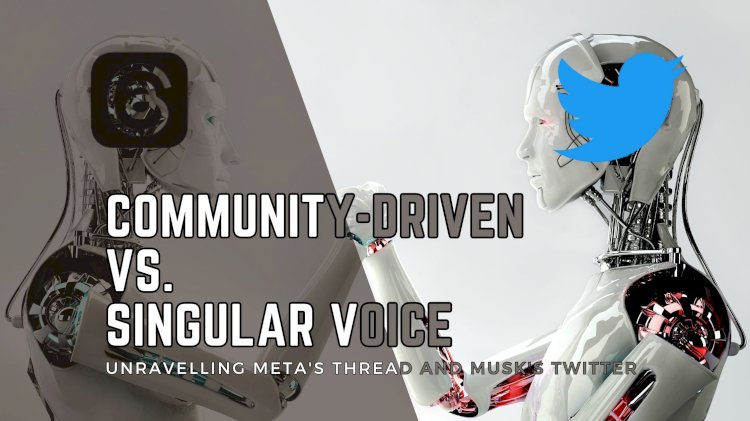Community-Driven vs. Singular Voice: Unraveling Meta's Thread and Twitter
Thread and Twitter are two influential social media platforms shaping the digital landscape. Thread, the latest addition by Meta, seeks to revolutionize communication with its 250-character limit, community-driven moderation and verified expert accounts to combat misinformation. On the other hand, Twitter, a global microblogging phenomenon, boasts a 280-character limit and real-time engagement, allowing users to participate in immediate global conversations. Both platforms have similarities, such as character limits, global reach, real-time engagement, mobile optimization, and hashtags, but differ in moderation approach and primary focus. While Thread emphasizes meaningful conversations, Twitter prioritizes real-time updates and one-way communication. As users continue to seek authentic interactions, both platforms will play essential roles in shaping the future of social media and digital communication.
By Shreya Rajvanshi Gangal

In the fast-paced world of social media, innovation and evolution are constants. Meta's new application, Thread, is the latest addition to the ever-expanding universe of social networking platforms. Thread promises to revolutionize the way we interact online, offering a fresh take on communication, content sharing, and community engagement. In this article, we will explore the key features, similarities, and differences between Meta's Thread and the widely popular Twitter, shedding light on how these platforms shape our digital interactions.
Meta's Thread: A New Dawn of Social Media
Meta, formerly known as Facebook, has been at the forefront of the social media landscape for years. With the launch of Thread, the tech giant aims to redefine the way users communicate and interact within online communities. Thread boasts several unique features that set it apart from traditional social media platforms, with a focus on fostering meaningful conversations and reducing the spread of misinformation.
One of the standout features of Thread is its character-limit mechanism, which distinguishes it from other platforms like Twitter. While Twitter allows users to post tweets with a 280-character limit, Thread takes a more minimalist approach, limiting posts to just 250 characters. This constraint aims to promote concise and impactful communication, encouraging users to be more thoughtful about their words.
Furthermore, Thread introduces a novel community-driven moderation system. Instead of relying solely on algorithms or centralized content moderation, Thread users collectively participate in evaluating the quality of posts. By empowering the community to curate content, Meta hopes to create a self-regulating ecosystem that promotes relevant, insightful discussions while filtering out low-quality or misleading content.
In addition to promoting meaningful conversations, Thread emphasizes the importance of credible information. The platform introduces verified expert accounts to provide users with reliable sources of information. This approach seeks to counter the spread of misinformation, which has been a pressing issue on many social media platforms.
Twitter: A Global Microblogging Phenomenon
Twitter, founded in 2006, has become a household name in the world of social media. With over 300 million active users, the platform has played a pivotal role in shaping public discourse, facilitating real-time news updates, and providing a direct channel for public figures to communicate with their followers.
Like Thread, Twitter also employs a character-limit feature, albeit with a slightly higher allowance of 280 characters per tweet. This limitation has become synonymous with Twitter's unique format, encouraging succinct messages and enabling rapid, bite-sized communication.
One of Twitter's defining characteristics is its real-time nature. Users can share tweets, react, and engage in conversations instantaneously. The platform's speed and accessibility have made it a go-to source for breaking news and trending topics, allowing users to participate in global conversations in real time.
Twitter's open and unfiltered communication style has also contributed to its popularity. Public figures, celebrities, politicians, and individuals alike can express their thoughts, opinions, and announcements directly to their followers without the need for intermediaries or extensive editing. This has allowed Twitter to become a powerful tool for communication and brand building.
Similarities Between Thread and Twitter
- Character Limit: Both Thread and Twitter have a character-limit feature to encourage concise communication and facilitate rapid interactions.
- Global Reach: Both platforms have a vast user base, making them influential platforms for connecting with diverse audiences around the world.
- Real-Time Engagement: Both Thread and Twitter enable users to engage in real-time conversations, fostering immediate interactions and discussions.
- Mobile-Centric: Both platforms are optimized for mobile devices, recognizing the increasing importance of mobile usage in social media engagement.
- Hashtags: Both Thread and Twitter employ hashtags as a means to categorize and discover content related to specific topics or trends.
Differences Between Thread and Twitter
- Character Limit Variation: While both platforms emphasize brevity, Thread enforces a stricter 250-character limit, whereas Twitter allows for 280 characters per tweet.
- Community-Driven Moderation: Unlike Twitter's reliance on algorithms and centralized moderation, Thread's unique feature involves community-driven content evaluation and moderation.
- Verified Expert Accounts: Thread introduces verified expert accounts to provide users with credible sources of information, a feature not present on Twitter.
- Primary Focus: Thread places a strong emphasis on fostering meaningful conversations, while Twitter's primary focus lies in real-time updates, news sharing, and one-way communication.
Conclusion
As social media continues to shape the way we communicate and connect, Meta's new application Thread emerges as a promising addition to the digital landscape. With its focus on meaningful conversations, community-driven moderation, and verified expert accounts, Thread introduces novel features that set it apart from Twitter and other traditional social media platforms.
On the other hand, Twitter's real-time engagement, open communication style, and status as a global microblogging phenomenon remain unparalleled. Both platforms offer unique opportunities for users to express themselves, engage with others, and stay informed about current events and trending topics.
The success of Thread and Twitter lies in their ability to cater to diverse user preferences and address the challenges posed by misinformation, polarization, and the rapid dissemination of content. As users continue to seek authentic and meaningful interactions online, both platforms will undoubtedly play crucial roles in shaping the future of social media and digital communication.
What's Your Reaction?



















